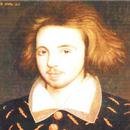Subject: Equal Time For Marlowe
Posted by: daver852
Date: Jun 13 12
I will confine my postings to a topic near and dear to my heart, i.e., that the works now attributed to William Shakespeare were actually written by Christopher Marlowe. My intent is to enlighten and inform, and not to disparage anyone holding a contrary opinion. Rabid Stratfordians are invited to shower me with abuse, and I will gladly answer any questions to the best of my ability.
Posted by: daver852
Date: Jun 13 12
I will confine my postings to a topic near and dear to my heart, i.e., that the works now attributed to William Shakespeare were actually written by Christopher Marlowe. My intent is to enlighten and inform, and not to disparage anyone holding a contrary opinion. Rabid Stratfordians are invited to shower me with abuse, and I will gladly answer any questions to the best of my ability.
2347 replies. 1 1 2 3 4 5 6 7 8 9 118
daver852 


|
Reply #81. Aug 24 12, 10:49 AM |
daver852 


|
Reply #82. Aug 25 12, 10:59 AM |
daver852 


|
Reply #83. Aug 26 12, 9:55 AM |
daver852 


|
Reply #84. Aug 28 12, 10:09 AM |
daver852 


|
Reply #85. Aug 29 12, 10:12 AM |
daver852 


|
Reply #86. Aug 31 12, 9:55 AM |
daver852 


|
Reply #87. Sep 01 12, 11:36 AM |
daver852 


|
Reply #88. Sep 04 12, 11:29 PM |
daver852 


|
Reply #89. Sep 08 12, 8:40 AM |
daver852 


|
Reply #90. Sep 10 12, 12:24 PM |
daver852 


|
Reply #91. Sep 11 12, 10:36 AM |
daver852 


|
Reply #92. Sep 21 12, 11:27 AM |
Mariamir 

|
I don't really frequent these blogs, but I have to say something here. This is wonderful! After reading it, I'm fully convinced. I do have a question, not disputing anything, but out of curiosity. If Marlowe was so bitter and upset about 1) being out of England forever and 2) someone else getting all the credit Why didn't he A: get someone else to publish his books somewhere else or B: use a different pseudonym since this one seemed to have gotten out of hand C: Stop writing D: expose Shakespeare without divulging the true author E: stop sending his masterpieces to England and publish in other countries ...? Reply #93. Sep 23 12, 8:20 PM |
SisterSeagull 


|
I agree.... This is a fabulous thread! Reply #94. Sep 24 12, 4:28 AM |
trojan11 


|
Daver missed his true calling. :) Reply #95. Sep 24 12, 7:02 AM |
daver852 


|
Reply #96. Sep 27 12, 9:23 PM |
daver852 


|
Reply #97. Sep 27 12, 9:32 PM |
daver852 


|
Reply #98. Sep 28 12, 11:52 AM |
Mariamir 

|
Okay, very good answers! One more question. This one puzzles me. Being out of the country, Marlowe would not have needed to flatter or ingratiate himself with any noble or royal. How then to you explain "The Merry Wives of Windsor", which was supposed to have been dedicated to Her Majesty? Who wrote that, and, if it was Marlowe, why? Reply #99. Oct 02 12, 6:18 AM |
daver852 


|
Reply #100. Oct 02 12, 11:20 AM |
2347 replies. 1 1 2 3 4 5 6 7 8 9 118
Legal / Conditions of Use
|
|
 :
: